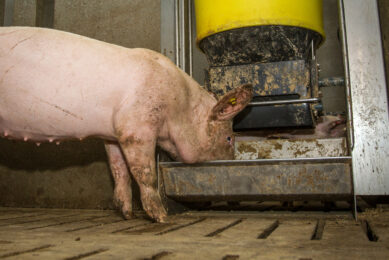RESEARCH: Nutritional value of different soybean types for pigs
Soybean meal is the most commonly used protein source in swine diets in the United States. In addition to conventional soybeans, researchers have bred varieties of soybeans to meet the various nutritional needs of pigs.
For example, soybeans low in oligosaccharides have been developed for feeding to weanling pigs, who cannot digest the oligosaccharides in conventional soybeans and may suffer reduced performance and even illness as a result. High protein soybean varieties have also been developed.
Existing information on the nutritional value of high protein and low oligosaccharides soybean varieties in swine diets is incomplete.
There is no difference in digestible energy, metabolizable energy, or digestibility of crude protein and amino acids between non-dehulled high protein full fat soybeans (FFSB-HP) and non-dehulled conventional full fat soybeans (FFSB-CV).
There are, however, no data on the digestibility of protein, amino acids, and energy in dehulled FFSB-HP, although most soybeans are de-hulled prior to being used in diets fed to pigs.
Similarly, there is no difference in digestible and metabolizable energy or amino acid digestibility between soybean meals produced from low oligosaccharide soybeans and conventional varieties, but there are no data on values for low oligosaccharide full fat soybeans (FFSB-LO).
Therefore, two experiments were conducted to determine standardized ileal digestibility (SID) of amino acids as well as values for digestible and metabolizable energy in de-hulled conventional, high protein, and low oligosaccharide full fat soybeans.
Key points
- The digestibility of crude protein and amino acids in low oligosaccharide full fat soybeans did not differ from conventional soybeans.
- The digestibility of crude protein and most amino acids in high protein full fat soybeans was less than in conventional soybeans, but the digestibility of arginine, histidine, methionine, tryptophan, glutamic acid, and proline did not differ between the two sources.
- Concentrations of digestible and metabolizable energy did not differ among conventional, low-oligosaccharide, and high protein varieties of soybeans.
- The concentration of digestible and metabolizable energy is greater in full fat soybeans than in corn.
More data and trial setup can be found at the monogastric nutrition laboratory of Hans H. Stein.











